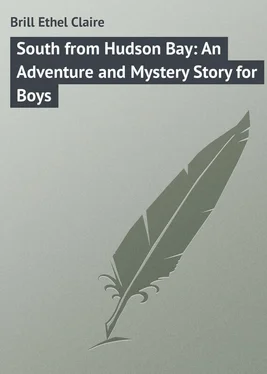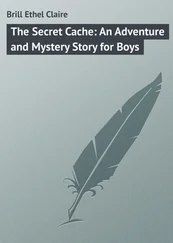Ethel Brill - South from Hudson Bay - An Adventure and Mystery Story for Boys
Здесь есть возможность читать онлайн «Ethel Brill - South from Hudson Bay - An Adventure and Mystery Story for Boys» — ознакомительный отрывок электронной книги совершенно бесплатно, а после прочтения отрывка купить полную версию. В некоторых случаях можно слушать аудио, скачать через торрент в формате fb2 и присутствует краткое содержание. Жанр: Прочие приключения, foreign_prose, на английском языке. Описание произведения, (предисловие) а так же отзывы посетителей доступны на портале библиотеки ЛибКат.
- Название:South from Hudson Bay: An Adventure and Mystery Story for Boys
- Автор:
- Жанр:
- Год:неизвестен
- ISBN:нет данных
- Рейтинг книги:3 / 5. Голосов: 1
-
Избранное:Добавить в избранное
- Отзывы:
-
Ваша оценка:
- 60
- 1
- 2
- 3
- 4
- 5
South from Hudson Bay: An Adventure and Mystery Story for Boys: краткое содержание, описание и аннотация
Предлагаем к чтению аннотацию, описание, краткое содержание или предисловие (зависит от того, что написал сам автор книги «South from Hudson Bay: An Adventure and Mystery Story for Boys»). Если вы не нашли необходимую информацию о книге — напишите в комментариях, мы постараемся отыскать её.
South from Hudson Bay: An Adventure and Mystery Story for Boys — читать онлайн ознакомительный отрывок
Ниже представлен текст книги, разбитый по страницам. Система сохранения места последней прочитанной страницы, позволяет с удобством читать онлайн бесплатно книгу «South from Hudson Bay: An Adventure and Mystery Story for Boys», без необходимости каждый раз заново искать на чём Вы остановились. Поставьте закладку, и сможете в любой момент перейти на страницу, на которой закончили чтение.
Интервал:
Закладка:
“From the prairie to the south. They’re not ordinary grasshoppers like the big green ones. These are smaller and a different color, and their horns,” – Louis meant their antennæ, – “are short. I never saw this kind till three years ago, and then they came all of a sudden. They ate up everything. Ugh, how they smell! We can’t camp here.”
The place was indeed impossible as a camping ground. The boats put off again to seek a spot where the waves had washed the shores clean of the remains of the dead insects. Louis was right when he said that they were not ordinary grasshoppers. They were the dread locust, – the Rocky Mountain locust. At the camp fire that night, the Canadian boy told Walter and his companions how the locusts had come to the Red River valley.
“I was at Fort Douglas with my father,” he began. “We had just come down from Pembina with some carts. Everything looked well on the settlers’ farms. The grain was in the ear and ripening. Then came the grasshoppers. These short-horned grasshoppers fly much higher than the ordinary kind. Their wings are stronger. They came in great clouds that darkened the air as if real clouds were passing across the sun. Late in the afternoon they began to alight, such hordes of them you can’t imagine. Men, women, and children ran out into the fields, crushing grasshoppers at every step, the flying creatures dashing against them like hailstones. The poor settlers could do nothing against such an army. They saved a few half ripe ears of barley, the women hiding them under their aprons, but that was all. By the next morning everything was gone.”
“Do you mean that the grasshoppers ate the crops?” asked Walter, scarcely able to believe what he had heard.
“They ate everything green,” Louis replied impressively, “not only the grain and the gardens, but every green blade of grass on the prairie.”
“And they have come again this year,” said Matthieu the weaver slowly, “and perhaps they have again taken everything.” His voice sounded discouraged.
“I fear it,” was Louis’ grave response.
“What did the settlers do for food?” asked Walter. “Did Lord Selkirk supply it?”
Louis shook his head. “That was a hard winter. Most of the colonists went to Pembina, where they could hunt the buffalo. They got some food from the Company and some pemmican from the Indians. But they had almost no seed for the next year. In the spring they sowed the little barley they had saved, and it came up and promised well. Then the young grasshoppers hatched out from the eggs left in the ground the year before, and ate it all. So again the settlers were without meal for the winter. The Governor sent M’sieu Laidlaw and other men into the Sioux country, up the Red River and down the St. Peter to the great Mississippi where there is a settlement called Prairie du Chien. It was a hard journey in winter on snowshoes, but they came back in June with more than three hundred bushels of seed wheat, oats, and peas. The seeding was too late for a good crop last year, but this year they hoped for a big one.”
“And the grasshoppers have come again,” Matthieu repeated dully.
Around points and among islands the boats threaded their way, hugging the shore most of the time, risking traverses across the mouths of bays when the weather permitted.
No food was left in Murray’s boat, nothing but a little tea. Fishing had to be resorted to, often with poor luck. Few animals were seen, though the howling of wolves had come to be a familiar sound at night. Flocks of ducks and geese passed high overhead, but to shoot them the hunters had to seek the marshy places in bays or at stream mouths. Bad weather caused so much delay that to take advantage of calm water or favorable wind everyone was compelled, more than once, to go breakfastless or supperless. Walter was reduced to skin, muscle and bone. He felt a constant gnawing hunger, was seldom warm except when exercising, and found his hard-won muscular strength diminishing. An hour’s pulling at the oar almost exhausted him. He wondered at Murray, on whose strength and endurance starvation seemed to have no effect. Even Louis admitted weakness and had lost some of his cheery high spirits.
At last the low shore at the south end of the lake, a long point of shingle and sand, came in view. When the water was high and the wind from the north, much of the long sand bar was covered, but luckily the lake was calm when the guide’s boat reached the point. Murray’s craft followed Laroque’s closely.
Sharing one gun between them, Louis and Walter went, with some of the others, hunting for their supper. They rowed along the sand spit to the marsh which was alive with birds, – ducks, geese, tall herons, and many other smaller kinds. In a little pond several graceful, long-necked swans were feeding. Walter did not think of firing at swans, but Louis had no scruples. He brought one down with his first shot.
At sunset the hunters returned to camp with four fat geese, one of which Walter had killed, two swans, and eighteen or twenty ducks. A party from one of the other boats brought in almost as many. For the first time in many days Walter had a chance to really satisfy his appetite. Wrapped in his blanket, he slept soundly on his bed of sand, untroubled by hunger dreams.
X
THE RED RIVER AT LAST
The mouth of the Red River divides into several channels that wind through the marsh. The guide chose one of the main waterways, of good depth and gentle current, and the oarsmen, eager to reach the settlement, pulled with a will. They had some forty miles, by water, yet to go.
“Why do they call it Red River ?” Walter asked Louis. “Not from the color of the water?”
“It is from the Indian name, Miscousipi,” was the reply. “I have heard that when the Saulteux and the Sioux fought a great battle on the banks, the water ran red with blood. Both nations claim the valley as a hunting ground.”
“Then it can hardly be a good place for settlers if the Indians fight over it,” Walter said doubtfully.
“There are only Saulteux and Crees on the lower river now. The Sioux no longer dare venture here. The upper river is the dangerous country.”
Where the marsh gave way to firmer ground, in an open space on the low bank of a creek coming in from the west, stood a group of Indian lodges. As the boat passed, the Swiss boy looked with interest at the low, round topped structures of hides and rush mats.
“Those are Saulteur wigwams,” Louis explained.
“No one seems to be at home to-day.”
“No, but they intend to come back or they would have taken down the lodges. There was a fight in this place many years ago. A band of Crees came down that stream, and the old people and children camped here, while the young men went to Fort York with their furs. That was before the Hudson Bay Company had posts in this part of the country. While the braves were all away, the Sioux came and killed the old people and took the children captive. So the stream is called Rivière aux Morts – the river of the dead.”
“What a fiendish thing to do,” Walter exclaimed, “and cowardly.”
Louis shrugged expressively. “It is the Indian way of fighting. The Sioux are not cowards, but fiends, yes. And so are the Crees and the Saulteux in war. I say it though my grandmother was an Ojibwa.”
“Have you Indian blood, Louis?” Walter asked in surprise. “I supposed you were pure French.”
“I am bois brulé , as we mixed bloods are called from our dark skins, and I am not ashamed of it. My father, he was pure French, and my mother is half French, but her mother was Ojibwa, Saulteur. Perhaps I do not look so Indian as le Murrai Noir .” Louis lowered his voice. “They say he is at least half Sioux.”
Читать дальшеИнтервал:
Закладка:
Похожие книги на «South from Hudson Bay: An Adventure and Mystery Story for Boys»
Представляем Вашему вниманию похожие книги на «South from Hudson Bay: An Adventure and Mystery Story for Boys» списком для выбора. Мы отобрали схожую по названию и смыслу литературу в надежде предоставить читателям больше вариантов отыскать новые, интересные, ещё непрочитанные произведения.
Обсуждение, отзывы о книге «South from Hudson Bay: An Adventure and Mystery Story for Boys» и просто собственные мнения читателей. Оставьте ваши комментарии, напишите, что Вы думаете о произведении, его смысле или главных героях. Укажите что конкретно понравилось, а что нет, и почему Вы так считаете.












